This week marks a milestone for all of humanity—Sunday was the 25th anniversary of the first broadcast of Mystery Science Theater 3000. The first ever episode, “The Green Slime” was shown on a small Minneapolis cable-access channel called KTMA on November 24, 1988. This is also the 22nd anniversary of the Turkey Day Marathon, which aired annually on Comedy Central from 1991 until 1995, and which will be returning this year! Joel Hodgson is curating an online marathon that will be available this Thursday starting at noon Eastern Time.
There are many things to say about MST3K, (and eventually I plan to say all of them) but since this is Thanksgiving week I wanted to thank the show’s writers for helping me with a very specific issue I had as a kid.
My parents had me late in life, and their parents were also a bit older when they had them—both sets of grandparents were too busy surviving the Depression to get married right away. Because of this I had a slightly larger cultural gap with my family than most of my friends did, and I was confused by their volatile relationship with their own childhoods. For me, it was easy: I liked nerdy things, I wanted to be a Jedi, and I didn’t care too much whether I fit in with the kids at school or not. My parents really cared about how other people saw them. They worried about not being Catholic enough. They went through phases of strict morality, but then punctured them by showing me Monty Python and telling me jokes about priests.
The thing that helped me understand this was my discovery of MST3K. Specifically, it was the shorts the guys occasionally riffed that helped me understand my parents’ childhoods. The shorts themselves are bite-sized propaganda with titles like “The Home Economics Story,” “Appreciating Our Parents,” “Body Care and Grooming,” and, probably best of all, “A Date With your Family.” They gave me a unique window into the culture and mindset of the 1950s and 1960s, because they’re pure social engineering, there is no aspiration to art, or even commerce—what they’re selling is a way of (white, middle-class) life which was only imaginable in the years after WWII. Without the veneer of fiction or glossy actors, the naked desires of the 1950s are exposed, and they turn out of mostly be a desire for libidos to be “starched and pressed” and for people to remain as pleasant and surface-level as possible.
In this world, social survival must be bought by rigid conformity to a cultural standard. You do what you’re told, you respect authority in all of its forms, and you absolutely perm or oil your hair, respective of gender, exactly the way your peers perm or oil their hair. The uniformity of these shorts gave me a concentrated dose of 1950s life—there is no irony, no self-reflection, no winking: this is what mainstream America wanted to look like. Or, more importantly, this is the ideal they wanted their children to make reality.
This is what my parents were raised to want to be.
And it’s fucking terrifying.
Naturally, being my parents, and very intelligent, they’ve spent their whole lives arguing with these ideals. And, thanks to the MSTies, I learned how to, too. You saw when I mentioned “no irony, no winking” thing? That extreme seriousness allowed the MST3K writers to create some of their darkest jokes and some of their most memorable riffs. With no characters or plot to worry about, they were free to focus on pure social critique. Many of the shorts turn into a battle between the Bots and the stern male narrators of the films. Crow particularly takes on the voice of the Narrator to subvert his insistence on conformity.
The shorts tend to focus on family life, cleanliness, and morality, but most of them have a solid throughline of guilt and shame. “Appreciating Your Parents” seems OK at first—a little boy realizes that his parents work hard, so he starts cleaning his room and helping with the dishes. So far, so good. But then you think about the fact that at the age of 7 this kid is saving his allowance because he’s worried about the family’s savings, and it becomes a much darker story. How much guilt has this kid internalized? Why are his parents letting him think that his weekly quarter is going to land them in debtor’s prison? Should an elementary school boy be hoarding money in Eisenhower’s America, or has Khrushchev already won?
Then there’s “A Date With Your Family.” This short takes the innocuous idea that families should try to sit and eat meals together, and turns it into a Lynchian nightmare of secrets and repressed sexuality. The Narrator (Leave it to Beaver’s own Hugh Beaumont!) is especially angry. I had already watched this short many times, but this week I noticed something truly frightening: every emotion is qualified with the word “seems.” For instance:
Narrator: They speak with their dad as though they are genuinely glad to see him.
Crow [as Narrator]: They’re not, of course…”
I mean, seriously, would it have been so hard for the kids to just be glad to see their father? Then there’s this:
Narrator: They converse pleasantly while Dad serves.
Mike [as Daughter]: No, I—I’ll just have Saltines.
Narrator: I said “pleasantly,” for that is the keynote at dinnertime. It is not only good manners, but good sense.
Crow [as Narrator]: Emotions are for ethnic people.
Narrator: Pleasant, unemotional conversation helps digestion.
Servo [as Narrator]: I can’t stress “unemotional” enough.
“Dinner Don’ts” are illustrated, for instance when “Daughter” talks animatedly to her family for a few minutes.
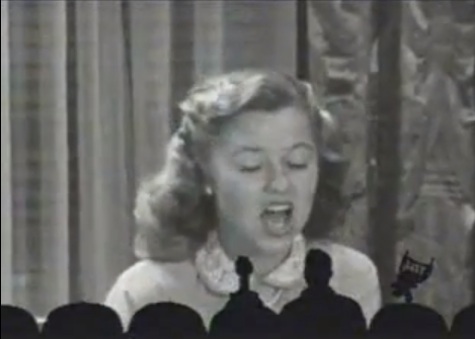
This infuriates her father.
Narrator: Don’t monopolize the conversation and go on and on without stopping. Nothing destroys the charm of a meal more quickly.
Mike [as Narrator]: …than having a personality.
Meanwhile, the shorts that I group as Grooming = Morality are fanatical, and promote a basic Calvinist worldview that the better your exterior looks, the better your interior must be. The connection between being “neat” and “looking exactly like everyone else” is blatant in these films, but the shorts are so committed to shaming their actors for individuality that when they play up the religious aspects in one like “Body Care and Grooming” it feels like they’re just reading between the lines:
Narrator: Clothes are important. Besides fitting well and looking well, the clothes should be appropriate for the occasion. Wearing inappropriate clothes, like these shoes—
Servo [as the Narrator]: Is immoral.
Narrator: —is a sure way to make yourself uncomfortable… and conspicuous.
Crow: Expressing individualism is just plain wrong.
Then you hit the straight up Morality ones like “Cheating.” In “Cheating”—Johnny lives in a perpetually dark home, where he sits beside a ticking Bergmanesque clock, and the faces of those he’s wronged floating before him.
I’m not kidding:
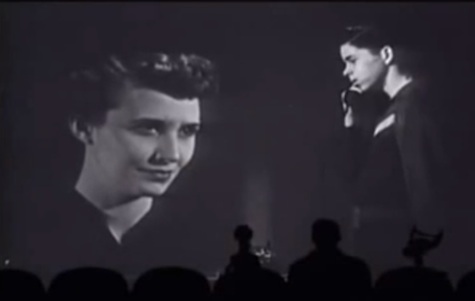
That’s cause he cheated on a math test. Really. That’s it. He didn’t murder his landlady, or participate in a genocide. He got a 92 on a math test instead of like an 80 or something. He gets kicked off the student council, and the kid who tells him the news seems actively happy.
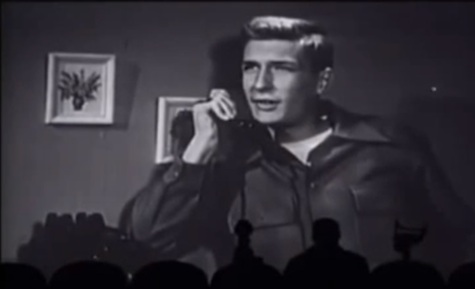
This is the unforgiving world my parents grew up in, and that’s before you get to all the Pre-Vatican II Catholicism.
It’s obvious to say that by exaggerating the seriousness of the films, the MSTies point out their absurdity, but for me it was more that by making the shorts the subject of their strongest critique they show the hypocrisy of this worldview. This is their best example of talking back to the screen, to Dad, to Authority in general, and by highlighting the distance between my essential worldview (do what thou will under snark… and love, I guess) and the one my parents had been raised with, I was able to create a better language for talking with them.
Now, do you want to talk about women? We can’t even talk about race, because there are only white people in this universe—they’ve imagined a Wonder Bread-white world that completely ignores any of the actual social upheaval of their time. But we can talk about the fact that the gender relations in these things… well, they leave a bit to be desired. There’s the ordinary sexism on “A Date With Your Family”:
Narrator: The women of this family seem to feel that they owe it to the men of the family to look relaxed, rested, and attractive at dinnertime.
But at least everyone shares equally in the horror in that film. In “Body Care and Grooming,” we’re introduced to a boy who is studying in public.

The Narrator wants to distract him with romance for some reason, and hopes that a pretty girl will walk by. When she does, she’s making the classic blunder of thinking in public, reading and taking notes while she walks. She is shamed by the narrator for having uneven socks.

Narrator: Sorry, Miss! We’re trying to a film about proper appearance, and, well, you’re not exactly the kind to make this guy behave like a human being!
Joel: [bitterly] You know, make him want to grope you and paw at you!
Once she is shamed into combing her hair and not carrying those dirty books around everywhere, she’s presented as an ideal:
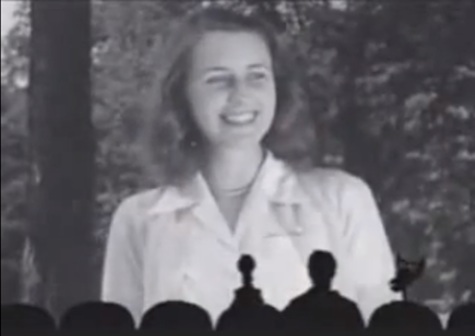
“The Home Economics Story” is the worst offender, though. It was produced by Iowa State College to encourage girls to go on to higher education, which in 1951 was still pretty revolutionary. But it’s all undercut by the fact that any pure learning that is offered to the girls, like physics class, has to be justified with the disclaimer that girls will need the information to be better homemakers. The longest sequences in the short focus on childcare.
The tone is pretty well summed up at the end:
Narrator: Jean and Louise were leaving for their jobs in the city, so you all drove down to the train station to see them all.
Servo: And to re-enact the last scene from Anna Karenina.
My mom didn’t go for Home Ec, she did the secretarial track, and ended up being a very highly regarded key punch operator in Pittsburgh. But it’s good to know that her society condemned her for wanting to be financially stable.
One of the weird things with MST3K is that unlike a lot of humor, it’s all about empathy (especially in the Joel years) and one of their tropes was staying on the side of the downtrodden characters. This emphasis on empathy in turn informed my dealings with my parents, even when they were at their most Eisenhowerian. So thank you MST3K, for helping me understand my family a little better! It may sound silly, but watching these shorts made me waaay more patient when my parents worried about my dating habits and utter lack of interest in conformity, girl clothes, marriage, etc. And I think that, with a little bit of guidance from me, my parents have mostly recovered from being exposed to these films at an impressionable age.
And what about you, viewers at home? Are there any pieces of pop culture you wish to thank?
This article originally appeared on Tor.com on November 27, 2013.
Leah Schnelbach has a lot more pieces of pop culture to thank, actually. But MST3K always wins. She’s also thankful for Twitter!










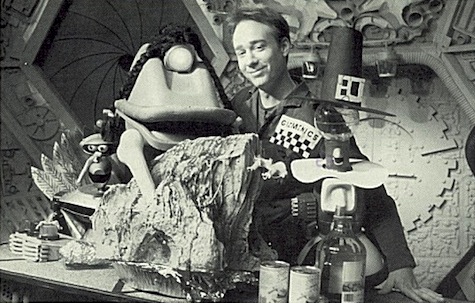
Hmmm don’t be to hard on the fifties ideal I mean marriage rasing a family still a good thing…..along with not cheating on math tests…and you know stealing. (But yes these are ridiculous especially the one where the girl is bad for having a book. It would be one thing if she came back with “even socks” and still a brain, but removing the books to showing exactly what they are really doing. Do not approve). Really does need to be more than do what you will under snark – having a job worth doing, doing it well, putting work ahead of play, that sort of thing! (But then I am a child of the 80’s so…..)
Mr. B Natural.
The shorts were my favorite part of MST3K but I actually remember seeing this one when they were recruiting for marching band at my school. The post-show robot debate over the gender identity of the “sexless man woman” is priceless.